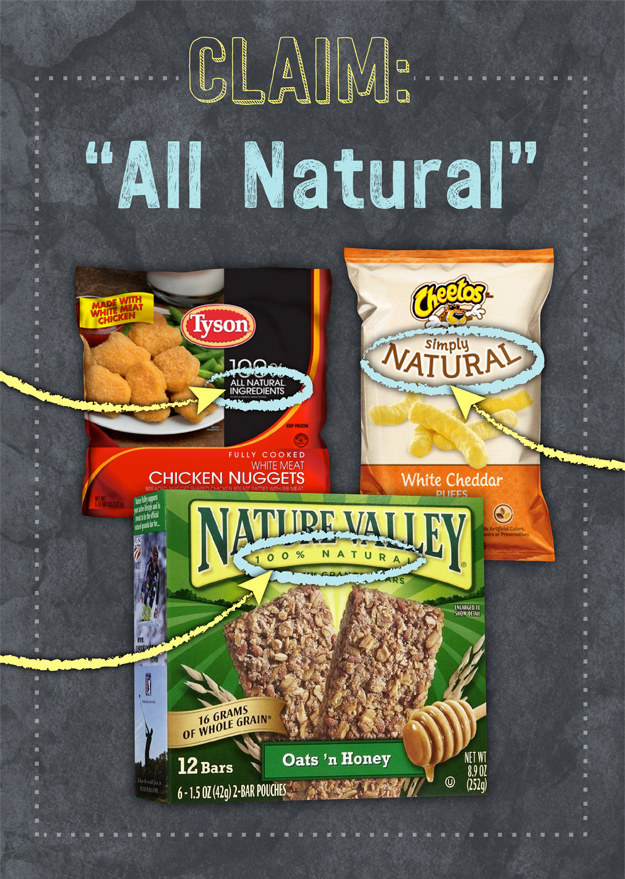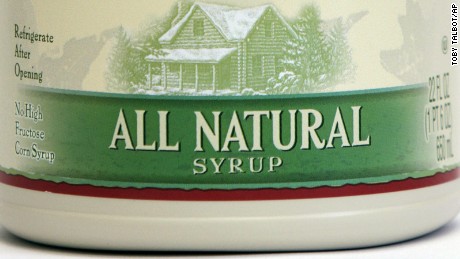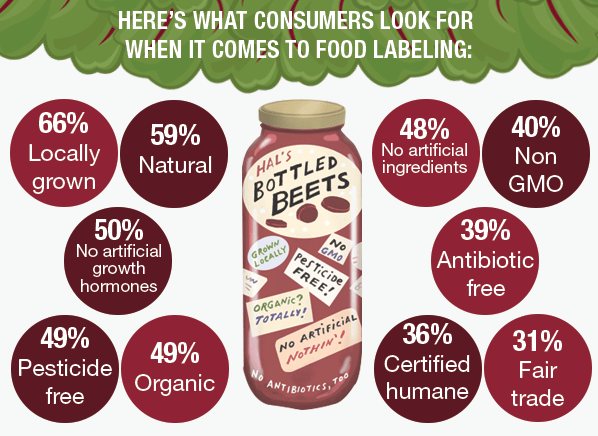40 natural claims on food labels
Food Litigation Trends: New and Undefined Label Claims in 2017 Pfizer Inc., Case No. 1:15-cv-02133 (E.D.N.Y. 2016) (noting the packages "clearly displayed the total pill-count on the label" and the claim "does not pass the proverbial laugh test"). The Supreme Court recently declined to take on Conagra's challenge to class certification in a suit over "natural" claims on ascertainability grounds. › category › natural-foodNatural Food Colors | All-Natural Food Coloring | Bulk Food ... Use all-natural food coloring for your baking needs without worrying about artificial ingredients. $8.99 Flat Rate Shipping on all orders or FREE SHIPPING on orders $89.99+ > Menu
Defining "Natural": Class Actions against Food Labels Lawsuits claim that disodium dihydrogen pyrophosphate is an odorless, industrial synthetic food preservative used to help retain a food's "natural" color. Disodium dihydrogen pyrophosphate is used in the leather and slaughter industries to remove stains from animal hides, as well as hair and feathers from poultry and hogs.

Natural claims on food labels
Method of production claims on food labels - Canadian Food Inspection ... while the guidance provided for natural claims would not normally recognize a food to be natural if it contains added vitamins or additives (for example, milk with added vitamins a and d, enriched flour), companies would clarify, using evidence-based measures, the meaning of the claim and demonstrate how this interpretation still meets the … "Natural" Food Claims: Industry Practices, Consumer Expectations, and ... In large part, natural claims occur within a regulatory vacuum. Current FDA policy deems the word "natural" on food labels to be a marketing term,6 and the term is neither clearly defined nor explicitly regulated.7 As a consequence, food and beverage manufacturers use natural claims ubiquitously, and there is very little FDA "Natural" Food Labeling | FDA Compliance Made Easy On November 12, the U.S. Food & Drug Administration ("FDA") announced that it is soliciting public comments on how the Agency should define the term "natural" and regulate its use in food labeling. The FDA has engaged the public's input after receiving two Citizen Petitions requesting the agency take action on establishing a formal ...
Natural claims on food labels. Healthy, Natural, and other Clean Label Claims | Registrar To label most foods as "healthy", current FDA regulations require that specified amounts of the product: Contain at least 10 percent of the daily value for vitamins A, C, calcium, iron, protein or fiber; Meet FDA requirements for a "low fat" and "low saturated fat" claim, and; Meet cutoff requirements for sodium and cholesterol. In Pictures: 29 Foods With "Health Claims" That Are Deceiving You And ... A. It's a little scary that food companies can put deceptive labels on foods we already know are unhealthy. I've first-hand see people say "oh, look, it's all natural!" and then never question the food from then on out.-Agreed. B. The whole "all natural thing." People think if a label says it's natural, it's fine to eat. Legal Guide to Health Claims on Food | Law@Dayton Legal Guide to Health Claims on Food. March 12, 2021. Healthy, all-natural, organic, low-fat. These terms appear on food labels everywhere, but only some of them have strict definitions and regulations. As nutrition guidelines change and more people are invested in how they nourish their bodies, digesting the information on food packaging ... Use of the Term "Natural" in the Labeling of Human Food Products ... the definition of "natural claims" in the fsis's food standards and labeling policy book, in relevant part, states that the term "natural" may be used on labeling for meat products and poultry products if the applicant for such labeling demonstrates that: (1) the product does not contain any artificial flavor or flavoring, coloring ingredient, …
en.wikipedia.org › wiki › Natural_foodNatural food - Wikipedia Natural food and all-natural food are terms in food labeling and marketing with several definitions, often implying foods that are not manufactured by processing.In some countries like the United Kingdom, the term "natural" is defined and regulated; in others, such as the United States, the term natural is not enforced for food labels, although there is USDA regulation of organic labeling. › understanding-food-labelsUnderstanding food labels - Canada.ca Find information on food labels and how to understand them. Learn about nutrition facts tables, serving size, list of ingredients, % daily value and nutrition claims. FDA seeks comments on use of the term 'natural' on food labels Speaking at FoodNavigator-USA's Natural & Clean Label online forum last year, food law attorney Steve Gardner (now of counsel at Stanley Law Group) said the only sure fire way to restore consumer ... Why Lawsuits Over 'Misleading' Food Labels Are Surging - The New York Times Without clear-cut definitions for words like "sustainable," "humane" or "natural," food companies have been using claims they know will resonate with Americans concerned with the environment,...
Six Meaningless Claims on Food Labels - The New York Times - Well Today's "Consumer Ally" column on AOL's WalletPop site explores misleading food-label lingo, noting that some commonly used phrases have "almost no meaning.". Empty claims like "Made with Natural Goodness," "Kid Approved" and "Doctor Recommended" have become as common as those with legal definitions. Today, even ... › use-term-natural-food-labelingUse of the Term Natural on Food Labeling | FDA Because of the changing landscape of food ingredients and production, and in direct response to consumers who have requested that the FDA explore the use of the term "natural," the agency asked the... Peeling Back the 'Natural' Food Label - Consumer Reports The label says "All Natural." But these fries contain xanthan gum, an ingredient extracted from a "slime" (we're not making that up!) produced from bacteria. Xanthan gum can be used as a thickening... What Does All Natural on a Food Label Mean? This means an ultra-processed snack food labelled 'made with natural flavours', may be construed as a better, healthier, or safer choice, simply because of the claim 'natural'. Yet, in reality this 'natural' snack food doesn't offer any advantages in terms of health or safety over its ultra-processed competitor who doesn't make the same claim.

5 Food-Label Claims Explained: All-Natural, Gluten-Free, Organic, Whole Grain, Calorie-Free ...
The Pitfalls of Making Free Claims in Food Labeling | Natural Products ... Claims that a food is free of a nutrient are permitted only where there is an FDA nutrient content claim regulation authorizing the claim for that nutrient. The nutrients for which there are FDA-authorized free claims include calories, total fat, saturated fat, cholesterol, sodium and sugar. Label statements that fall under the FDA free ...
Are your "all natural" claims all accurate? - Federal Trade Commission The products have names like "Coconut Shea All Natural Curl Defining Creme" and "Jojoba Monoi All Natural Shampoo," but in reality they contain a range of synthetic ingredients like polyquaternium-37, phenoxyethanol, caprylyl clycol, and polyquaternium-7. Beyond Coastal advertises that its "Natural Sunscreen SPF 30" is "100% natural."
Natural and Organic Label Claims - Agriculture Natural and Organic label claims are used on food products to describe how they were grown, raised and/or processed. Two federal government agencies oversee the production and labeling of food in the United States to ensure that the label claims are truthful and not misleading.

The Truth About Food Label Claims: All Natural, Gluten Free, Organic, Whole Grain, Calorie Free ...
8 misleading food marketing labels | AGDAILY Here are 8 of the most common misleading food marketing claims: 1. No nitrites or nitrates added. ... or has been added to, a food that would not normally be expected to be in that food." Although a "natural" label usually implies healthier and/or safer, that's just not the case. Whether a chemical is natural or synthetic tells you ...
sentientmedia.org › misleading-food-labels13 Misleading Food Label Claims and How Not to Be Tricked Oct 20, 2021 · The Food and Drug Administration (FDA) provides guidelines for a variety of common food labels, including sugar-free. While the term suggests that products labeled this way would be completely free of sugar, they can actually contain up to 0.5 grams of sugar in a single serving size.
'Natural,' other food labels that may not be legitimate - CNN 'All Natural' - The FDA does not define what terms such as "natural" mean, despite urges from policy groups. Hide Caption 2 of 9 Photos: Food labels that sound legitimate but aren't 'Organic' -...
Natural Label Claims - Canadian Food Business DEFINING "NATURAL" The Canadian Food Inspection Agency (CFIA) has issued guidance to industry on the use of natural and, more specifically, on how the prohibition against false and misleading labeling and advertising will apply in the case of natural claims.
What's in a Claim? Would a Food Not Labeled "Natural ... - AOCS FDA is charged with ensuring that food labels are not false or misleading but has acknowledged the difficulty of defining a food as natural because most foods have been at least minimally processed. Historically, FDA has not objected to use of a natural claim for foods that do not contain added color, artificial flavors, or synthetic substances.
Food Label Claims - Agriculture Producer or Food Manufacturer. Example: Free Range. Producer claims do not have to go through external third-party audits. Some but not all statements must meet certain standards in order to be used (e.g., "free range" must meet USDA standards whereas "natural" is not as regulated) Not government defined but must comply with food ...
› food › food-labeling-nutritionLabel Claims for Food & Dietary Supplements | FDA Among the claims that can be used on food and dietary supplement labels are three categories of claims that are defined by statute and/or FDA regulations: health claims, nutrient content claims,...
Which food labeling claims put you most at risk of a class action ... Find out more about the hot button issues in food litigation, from Prop 65 to natural claims at the American Conference Institute (ACI) food law conference in Chicago on April 23-24. Get the full ...
› food-labelsFood Labels | Nutrition.gov Food and Drug Administration (FDA) regulates the safety of food for humans and animals, including foods produced from genetically engineered (GE) plants, sometimes referred to as "genetically modified organisms" (GMOs). Find out more about the safety of GE plants, and how they are regulated here.
Natural - Consumer Reports Overview: CR surveys show that most consumers think that the claim "natural" on a food package should mean that the product contains no artificial ingredients, that it was produced without...
Natural Claims: The Case for Clarity - FONA • 69% indicate "contains no artificial colors, flavors or preservatives is more important than "natural" when purchasing food or beverage products. • 52% of respondents are more trusting of a company whose products carry an organic claim than companies whose products don't.
FDA "Natural" Food Labeling | FDA Compliance Made Easy On November 12, the U.S. Food & Drug Administration ("FDA") announced that it is soliciting public comments on how the Agency should define the term "natural" and regulate its use in food labeling. The FDA has engaged the public's input after receiving two Citizen Petitions requesting the agency take action on establishing a formal ...
"Natural" Food Claims: Industry Practices, Consumer Expectations, and ... In large part, natural claims occur within a regulatory vacuum. Current FDA policy deems the word "natural" on food labels to be a marketing term,6 and the term is neither clearly defined nor explicitly regulated.7 As a consequence, food and beverage manufacturers use natural claims ubiquitously, and there is very little
Method of production claims on food labels - Canadian Food Inspection ... while the guidance provided for natural claims would not normally recognize a food to be natural if it contains added vitamins or additives (for example, milk with added vitamins a and d, enriched flour), companies would clarify, using evidence-based measures, the meaning of the claim and demonstrate how this interpretation still meets the …














Post a Comment for "40 natural claims on food labels"